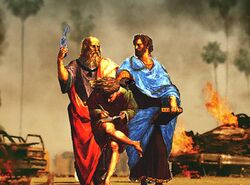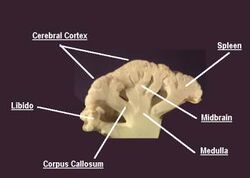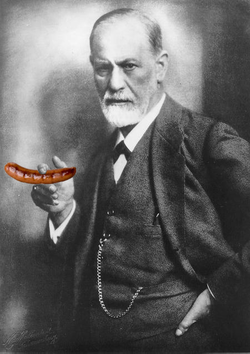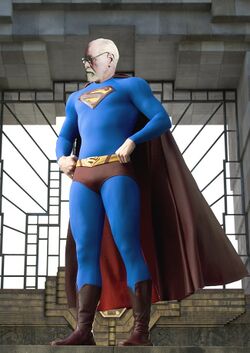Psyché
| Part of a series of articles on Psychoanalysis | |

| |
|
Concepts Important figures Important works | |
Psyché (pronounced [ˈsaɪk]) is a word of Greek origin. It generated from the days of the Ancient Olympics games where the competitors would compete naked. At the time Greece was broken into two city states, the Athenians, or nerds who would seem to be uncomfortable as soon as they let go of their abacuses, and the Spartans, or jocks who seemed to be uncomfortable when presented with abacuses. Prior to any major competition the two teams would attempt to scare their opponents through various means such as eating glass, breaking abacuses, doing extremely difficult algebraic equations, or having large penises. This mental form of the games was known as the psyché based upon the quote from Aristotle n00b, I pwned you, Psyché which literally translates as "Nubians, I owned you, Sick!"
The concepts of psyché runs into several interpretations, whether monistic, dualistic, trialistic, quadralistic, or putonlipstic. The word Psyché is also synonymous with mind but sounds more impressive when used in an essay.
Greek interpretation of the psyché
| This page was originally sporked from Socrates, Plato and Aristotle, but they've been dead for a while so they won't mind. |
The Ancient Greeks used the same word for alive as for ensouled. They also used the same word for soul as they used for mind. In fact there is considerable debate that the Greeks were not the great thinkers and philosophisers that history suggest that they were, but rather that they only had half a dozen words, so where it is supposed that Socrates stated "True knowledge comes in knowing that you know nothing", the reality is that he may have been saying "How the hell should I know?", or even "Goat and mustard on rye, and an amphora of crushed kola beans and distillate of the leaves of the coca plant."
Socrates and Plato
Plato, drawing on the words of his teacher Socrates, considered the soul as the essence of a person, being, that which decides how we behave. He thought that the psyché was separate from the body, kind of like an imaginary person on your shoulder. Rather, two imaginary people, one on each shoulder, as well as the central person, in this case you.
On the left shoulder was the thymos. The thymos was the masculine emotional motive, that leads to bravery, glory, and bananas. If this was left unchecked, then this could end up resulting in hubris, which can be translated as "overwhelming pride", or "a dish comprised of eggplant and curdled goats milk yoghurt."
On the right shoulder was the eros. The eros is the feminine appetite motive, which lead to eating, sleeping, and bananas. If this was left unchecked, it could lead to hēdonē, which translates either as "the search for pleasure", or as "an extract of certain plants from the island of Cyprus."
In the middle was logos, or the mind. Plati[1] have described this as "the brave charioteer, directing the balanced horses of appetite and spirit." It has been surmised that he may have been out of his logos at this stage, due to drinking a mix of crushed kola beans and distillate of the leave of the coca plant, eating a dish comprised of eggplant and curdled goats milk yoghurt, and sniffing an extract of certain plants from the island of Cyprus.
Aristotle
Aristotle then further defined the psyché in his work de Anima. In this he broke the intellectual part of the psyché into two principle parts, then he divided the first of these three again, and the second of these he broke into five parts. He then broke the second part of the original three parts into three parts, of which he broke these into four, three, and eight parts respectively, but then amalgamated the eighth part of the third breaking of the second part with the third part of the first breaking of the first part. He then postulated that the psyché was not separate from the body, but not a part of the body either, but it was the function of the body, and the thing that drove the body was the function of the body, and the function of the body was defined by the driving force of the body. In other words, the psyché was what the body did and what drove the body to do what it did, and the body was a tool of the psyché that in it's actions defined the psyché.
Nobody really reads Aristotle today.
Freudian interpretation of the Psyché
| This page was originally sporked from Freud's id but got cleaned up by his super-ego. |
The one man who changed the definition of psyché to modern thinking more than any other was Sigmund Freud[2].
The three parts of the Psyché
Freud broke the psyché down into three parts when creating his "structural model" of the "psychic apparatus" These are das Es, das Ich, and das Über-Ich. He decided upon these terms when dissecting a brain to look for the separate parts of the personality. In his haste he managed to make a fairly significant mess, and called the component parts Literally the ooze, the ick, and the Super-ick. These were later Latinised by his translator as the id, ego, and super-ego.
Freud's first discussed the structural model in his 1920 essay "Beyond the Pleasure Principle: The structural model." This was based upon an earlier work of his "The Pleasure Principle. Images of twenty women in varying states of undress" and then followed up by his later work "Even further beyond the Pleasure principle: The structural super model."
Id[3]
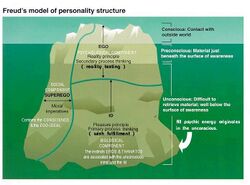
The Id is a hang-over from our caveman days and acts on the "seafood" principle[4]. If it weren't constrained by reality we would have no impulse control.
| “ | It is the dark, inaccessible part of our personality - Could you get me that cigar my dear - what little we know of it we have learnt from our study - No, the cuban cigar - study of the dream-work and of the construction of neurotic symptoms - Actually while you are down there - and most of this is of a negative character and - No, a little slower than that - can be described only as a contrast to the ego.[5] | ” |
The id is responsible for our basic drives such as food, water, sex, and basic impulses. Freud later divided the Id into two sections, known as the Life and Death impulses.
Ego
Contrarily, the Ego works on what is known as the "Get real" principle. It assesses the desires of the Id and rejects those that don't fit in with reality, much the same way that a spam blocker blocks spam in your e-mail.
| “ | ...The ego is that part of the id which has - Stop that - has been modified by the direct influence of the external world - I'm in the middle of a lecture, we can't do that now - The ego represents what may be called reason and - Yes, I still love you, liebchen, but we can't play hide the Bratwurst until later - and common sense, in contrast to the id, which contains the passions.[5] | ” |
Super-ego
The Super-ego is above the Ego and the Id as a super-controller, always striving for perfection. It is faster than a speeding bullet, more powerful than a laxative, able to leap to tall conclusions in a single bound. It is the opposite of the id, where the id is the baser, more primitive mind, trying to fulfill the basic needs, the Super-ego is constantly stamping on the fingers of the Id as a form of self-censorship.
| “ | The Super-ego can be thought of as a type of conscience - Leave that alone or you will feel the back of my hand - that punishes misbehavior with - Mein Gott in himmel, stop doing that woman - feelings of guilt. For example: having extra-marital affairs - Just like you, you filthy Jezebel.[5] | ” |
Summary
It appears that the concept of the psyché as detailed by Freud was simply a re-working of the definition of psyché as initially detailed by Plato, who based his writings solely on the teachings of Socrates.
Carl Gustav Jung has since expanded on the works of Sigmund Freud, incorporasting some of the early work of Aristotle. Edward de Bono has since taken the works of Carl Gustav Jung and re-written them in a classic example of Parallel Marketing, a side consequence of Parallel Thinking.
Notes
- ↑ Plural of Plato.
- ↑ More commonly known to his friends and family as Siggy, leading to the famous quote by his mother "Sometimes a Siggy is just a Siggy."
- ↑ Originally Freud wrote 'Oz' until told it was (A) a childrens book and (B) a nickname for poorly educated New Zealanders.
- ↑ "I see food, I eat food. I see woman, I eat woman!"
- ↑ 5.0 5.1 5.2 Freud, New Introductory Lectures on Psychoanalysis (1933)
See also
Your doctor if symptoms persist.
| Featured version: 1 September 2009 | |
| This article has been featured on the main page. — You can vote for or nominate your favourite articles at Uncyclopedia:VFH. | |
